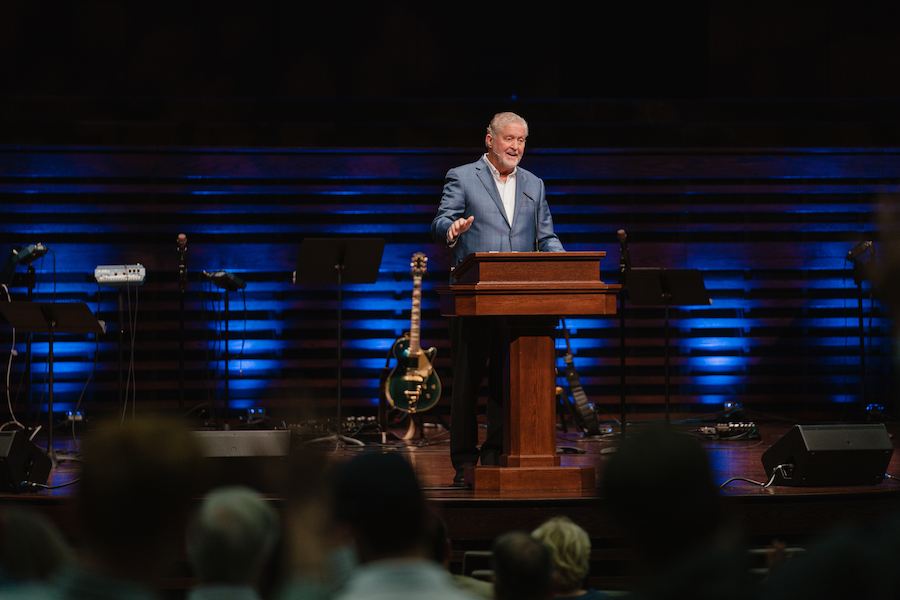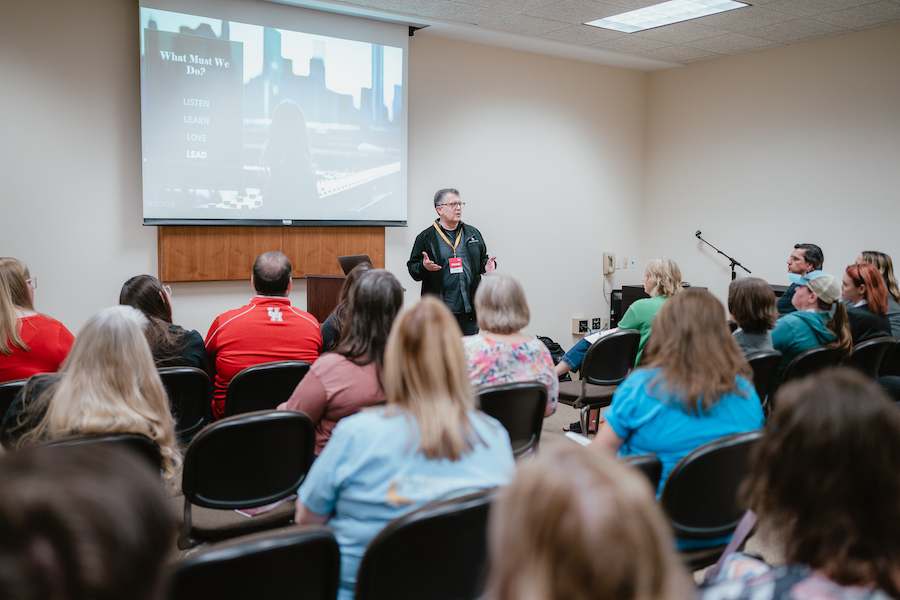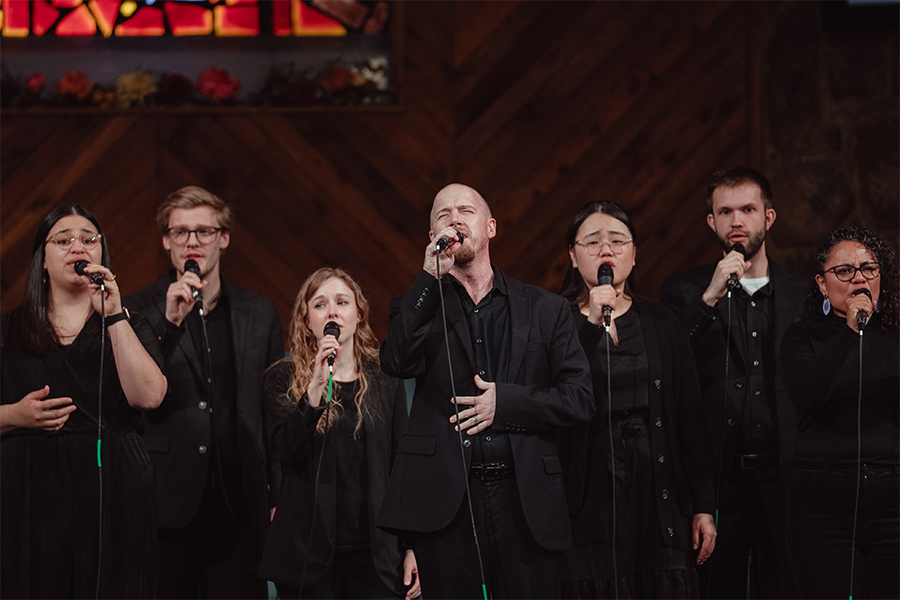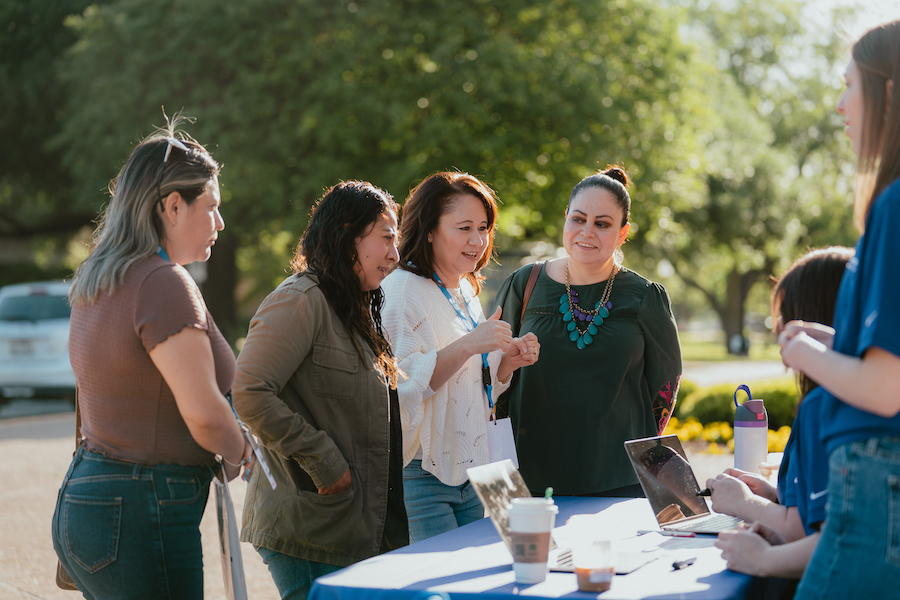Global Missions Week challenges students to see lostness, need for Gospel witness in South Asia


It is “important not to neglect the reality of the lostness,” Lilly* said during Global Missions Week at Southwestern Baptist Theological Seminary and Texas Baptist College held Feb. 28-March 4.
Lilly and her husband, Alex,* who are Southwestern Seminary graduates and International Mission Board (IMB) missionaries, were part of the South Asian mission team who interacted with students through events hosted by the World Mission Center (WMC) at Southwestern Seminary.
Through sharing testimonies in classes, question and answer sessions, and fellowship meals, Southwestern Seminary and TBC students learned more about reaching the 1.6 billion lost people in the countries of the region. Missionaries shared the region is not only the highest concentration of lost people worldwide but also has the highest concentration of Muslims in the world. Students also heard of opportunities and ways they could serve in short- and long-term missions capacities.
Participating in Global Missions Week allowed the missionaries to share about a place in the world that has “obvious neglect and very little witness,” Alex said. Sharing with students and answering their questions about mission service in South Asia allowed him to remind people of their Great Commission and Gospel stewardship, he said.
Ian Buntain, director of the WMC and associate professor of missions in the Roy J. Fish School of Evangelism and Missions, said the purpose of Global Missions Week is to help educate students of the need for the Gospel, while simultaneously encouraging them to consider a call to missions.
“We long to challenge our students to live for something that is worth dying for–and to be engaged in the only Christian activity that will not be done better in heaven,” Buntain said. “We not only want to expose them to the reality of global Gospel poverty, but we want to introduce them to men and women who were once exactly where they now are, and who are now serving the name of Jesus overseas, to the praise of His glory. And we pray that as they interact with our missionaries each day, that the Lord would lend them the courage to imagine themselves in their shoes.”
Micah*, an IMB worker who serves in South Asia with his wife, Amy*, challenged the TBC male students during an IMB-sponsored lunch for college students. Sharing his own testimony, Micah explained as a young man he had made “idols” of money, people, marriage, preferences, and status. Noting that one young, single man goes to the mission field for every nine young, single women who commit to serve, Micah encouraged the college males not to be distracted by the things of the world.
“I want you to be honest with yourself and I want you to challenge other young men to be honest with themselves and ask them what it is that they’re living their lives for,” Micah said.
TBC students learned more about opportunities to serve through the IMB’s journeyman program, a two-year commitment of service overseas, and Hands On, a semester-long missions experience that allows students to serve overseas while being mentored by an IMB worker.
Maya Grace,* a Southwestern Seminary Master of Divinity student from North Texas, said the week allowed her “direct contact” with missionaries that enabled her to learn from their experiences. Grace heard missionary testimonies through her classes and through Chai and Chats, an opportunity for female students to ask questions of IMB female field workers.
Grace said hearing the testimony of Cassie*, a missionary who works in the red-light area and slums in a large metropolitan area of India, reminded her of the sufficiency of the Gospel.
Cassie shared women in the red-light area have many “hang-ups” as they are learning to follow Christ as “forgiveness is not part of their natural culture” in South Asia. She said the story of Jesus healing the woman who touched His robe, though she was considered “unclean” due to bleeding for 12 years, often resonates with the women she encounters.
“I think seeing the more upfront realities of sin in this world, and the effect of that, and the ways that we’re sheltered a little bit in the United States and don’t see that, but to see the joy of being able to go into those areas” as Cassie shared her experience of “the sufficiency of the Gospel, to speak into that brokenness,” was most impactful to her, Grace said.
Grace said she recognized “they need people over there” as missionaries compared some of the lostness of the most populous cities in South Asia to cities in the United States. However, the weeklong emphasis also reminded her that she can share the Gospel with the same people groups in Fort Worth as she completes her studies.
In partnership with the monthly meeting of the Indian Student Fellowship on campus, Southwestern Seminary and TBC students enjoyed South Asian dishes, worship in four of the languages of the region, and attended four different workshops that allowed more opportunities to ask questions of the missionaries or begin the application process with the IMB.
Sanjay*, a Southwestern Seminary Doctor of Philosophy student who attended the fellowship dinner with his wife and daughter, is originally from South India. Prior to beginning his doctoral work in Fort Worth, he taught and pastored in the region for 12 years. Upon graduation in two years, he will return to train pastors and leaders. He said the focus on the region was “a great pleasure to see.”
“We rejoice because so many people from U.S. stationing in our country and [involved] in the training program and ready to do something you know–wonderful,” Sanjay said.
In a final word of encouragement and challenge to the Southwestern Seminary and TBC students in his workshop, Micah said success is defined as obedience to God.
“His Spirit, His Word are sufficient to guide you where He wants you to go if you’re willing to listen, but most importantly to obey,” Micah challenged. “And so that obedience component, never underestimate what it is that God desires.”
For information or inquiries about missions opportunities through Southwestern Seminary or the IMB, email wmc@swbts.edu, or visit the World Missions Center, located in Mathena Hall 108.
*Name changed for security



